About King Mojo Records
In 2004 veteran music promoter Dick Wooley launched
King Mojo Records
to showcase emerging artists in contemporary Blues-Rock. Since then
King Mojo artists have had 1.8 million downloads by their new fans.
|
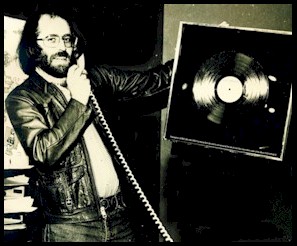
Dick Wooley
"Music Promoter"
Photo 1973 By Sidney Smith
|
|
40 years in music and
still having fun... to read more history click on a blue link.
Atlantic Records | The
Adventure | Capricorn Records |
The Start-Ups | King
Mojo Records
After launching several Indy label hits in 1967 Atlantic Records recruited Dick Wooley to
head their record promotion in the Southeast and Midwest. Dick helped Atlantic launch
several legendary Rhythm & Blues and Rock artists, many who are now inductees in the Rock and Roll
Hall of Fame. ~ Working with Atlantic Records distributed Capricorn Productions Dick
was recruited Vice President of Promotions when it debuted as Capricorn Records in 1972 with Warner Brothers. Dick promoted several
artists at Capricorn into a tidal wave of hit records that coined the term "Southern
Rock". ~ In 1976 leaving Capricorn at the top of the charts, Dick partnered with
Atlantic Records and started Dick Wooley Associates, together they launched the
Indy label Rabbit Records. Rabbit
launched several new artists onto the national charts and Dick Wooley Associates launched
other label’s new artists into gold and platinum sales. ~ In 1981, Dick decided to
move to the beach and retire from the music business. Tax advantages changed that year and
Dick began marketing ocean-front investment properties. In 1983 he partnered with
Benchmark/Atlantic and successfully developed seven university and two ocean front
condominium communities. ~ In 2004 Dick was inspired to return to music and opened
Internet based King Mojo Records to showcase emerging artists in contemporary Blues and
Rock.
"South Rock"
by
Kiki Lee
Forward:
Dick Wooley played guitar in a
college rock band after serving four years in the Navy and in 1965 to keep growing his
connection to the music business he got a job at the largest independent record
distributor in the Southeast, Southland Record in Atlanta. Dick worked days with many of
the legendary music figures of the day and on nights and weekends managing his own bands,
booking gigs and promoting shows.
In 1966, Dick's extra efforts paid off when
one of his bands had a regional hit single, the record never made the national charts, but
it did open the doors for a great career in the music business.
In 1967, Dick got a call about doing record promotion from
John Towels, John was the sales manager for a large record distributor based in Charlotte
North Carolina called F & F Arnold. Gwen Kessler, Southland's legendary office manager
and head of NARAS had recommended Dick for the open position and Gwen's recommendation was
good enough for John, he hired Dick to promote F & F distributed records in North and
South Carolina.
In Charlotte, Dick promoted F & F's independent lables
and worked daily with some of the most interesting people in the music business, people
like mob music boss Morris Levy of Roulette Records, "The Sopranos" TV show
based the character "Herman 'Hesh' Rabkin" on Morris. Dick helped kick start
Kenny Rogers solo career with his first hit single and worked with Marty Lacker of Elvis's
Memphis Mafia and with Roy Orbison at Monument Records. Dick discovered a local band "The Okasions" and
turned their local hit single into the multi-million selling "Girlwatcher", Dick also started several hit
records for the soulful independent label Atlantic Records.
Atlantic
Records: Making Music Legends
Dickey Kline, Atlantic's Miami based super-promo man had been keeping
track of Dick's progress in the Carolinas and introduced him to Atlantic's new Vice
President of Promotion Jerry Greenberg at a company convention in the Bahamas. Jerry was
building his new promotion team and recruited Dick to head-up promotions for the company
in the Southeast and Midwest. Dick was eager for an opportunity to work for a great
company like Atlantic Records and with the best wishes from John Towles and the F & F
Arnold company, he moved to Cincinnati Ohio to open Atlantic's regional promotion office.
Record promotion was not easy back in the halcyon days of vinyl records. This was years
before the competition of the Interstate highway system and Dick routinely drove
fifteen-hundred miles each week over rural two-lane black top roads to promote Atlantic
Records to the large and small market Top 40 and R & B radio stations throughout the
Midwest and Southeast.
Building friendships and personal relations with radio programmers was Atlantic Records
way of doing business and it was their staple strength. No expense was spared by
Atlantic's promotion men to make alliances and entertain radio programmers, after all they
were a key to Atlantic's success. Unlike many other record companies of the day, at
Atlantic there was no pay for play, or as it was more commonly called by government
investigators "Payola". Money wasn't exchanged for airplay, we offered music
directors the career building professional courtesy they deserved and they showed us their
appreciation by adding our
records to their playlists when the chips
were down
Record promotion was challenging work at Atlantic, because at the time Atlantic was a
small Indy label that could only afford six full-time promotion men, and each man had an
area of responsibility that made sure every radio station, show promoter and independent
record distributor in America was covered. This gang-of-six was headed by Jerry Greenberg and included; Dickey Kline, Leroy Little, Bob Greenberg, Vince Faracci and Dick Wooley.
These six guys could sometimes perform miracles when getting Atlantic records to the top
of the charts and they did it against all odds especially when competing against the
highly financed major record companies of the day. At the time, it was not uncommon for
two labels to release the same song by different artists, "when this happened we
covered so many radio stations in forty-eight hours it felt like we were competing in the
Olympics and Atlantic never lost one of those challenges".
Dick said, "It was a real privilege being a member of that elite group and it was a once in a lifetime experience to work with the greatest music legends of all time, geniuses like Ahmet Ertegun,
Jerry Wexler and Tom Dowd."
It was during the 1960's that Atlantic Records established many of their greatest legends
in R & B and Rock and Roll and several are"Hall Of Fame" artists like: Percy Sledge,
Otis Redding, Wilson Pickett, Aretha Franklin,
Joe Tex, The Young Rascals, King Curtis, Sam & Dave, Crosby, Stills, Nash and Young,
Buffalo Springfield, Cream, Eric Clapton, Delaney and Bonnie, Led Zeppelin,
YES, Emerson, Lake and Palmer, Derek And The Dominos.

Jerry Wexler |

Ahmet Ertegun |

Tom Dowd |

Jerry Greenberg |
The 1960's was a
turbulent period in American due to the bloody Vietnam War and the country was divided
into two camps. The conservatives, who backed the war, and young draft age anti-war
protesters who didn't. The latter often found themselves under FBI surveillance, many were
beaten or arrested on trumped up charges by overly aggressive government agents. In many
cities there was a regular curfew and some cities declared martial law, arguably America
was a Police State.
The military industrial community of war-lovers were in power and the anti-war protestors
were disenfranchised and powerless. The frustration felt by students amd musicians about
our country's inability to bring a solution to end the war produced a generation of
counterculture artists who made the most profound and relevant music of the century.
This was an eventful period in music business history and at Atlantic Records we were
especially proud to be a part of a peaceful solution and had signed many of the anti-war
movement's leading voices to our label. After the senseless and bloody attacks on
counterculture students at Chicago's Democratic convention and the Kent State
massacre were televised, an outrage against the government's war began building. The
average person in America never spoke out, because the rich military industrial
conservatives ruled the media and said "my country right or wrong" and plain
folks were afraid to speak out against the government... which we once naively
called our government.
An example of distrust in government Dick recounted, was when he visited radio stations
around the country promoting Atlantic's socially active artists and found most radio
programmers were paranoid about attracting FCC attention, fearing government retaliation
if they played counterculture inspired records. It was tough times for record promoters,
their jobs depended on getting airplay for new artists and every week they did battle
with the radio programmers to get socially progressive records added to station playlists.
However, the dominant AM stations chose instead to play it safe and program mindless
"bubblegum songs" and not socially active music. But the pent-up demand by the
"Woodstock" generation for progressive music on radio could not be denied and no
one can stop an idea when its time has come.
Another prime example of the "Big Brother" atmosphere in America began one day
when Dick was in Miami promoting
records and Atlantic's legendary record producer
Tom Dowd was accross town producing an album
with Eric Clapton, Duane
Allman, Bobby Whitlock,
Jim Gordon and Carl Radle, known as "Derek and the Dominos." Tom invited
Dick to sit in on the session at Criteria Studios.
Ahmet Ertegun, the owner of Atlantic Records was also at the session and as Dick
recalls, "the music being made in that Miami studio can only be described as
incendiary blues magic." Some months later, when Atlantic released the "Derek
and the Dominos" album, Ahmet was naturally high on his expectations for national
airplay, but once again the dominant AM stations refused to play the album's first single
"Layla". They cited the same old excuses they always used... too progressive for
their audience, (their code for "we're afraid to play it because the FCC might screw
with us"). Dick said, "This was the last straw for me, these timid programmers
boasted about being Rock and Roll stations! I wondered how long could they go against the
rising tide of their young listeners. "My opinion was and is Rock and Roll is about new
music and Layla was the best new music in a decade. I held my tongue, but I was mad as
Hell because I knew there had to be a better way to exposure new artists without groveling
for radio station airplay."
The downside for those timid radio programmers must be guilt, because today they know they
missed a once in a lifetime opportunity to help shape music and maybe history itself. I
wonder how different music would be now if they had been onboard early playing legendary
social artists like: "Janis Joplin, Bob Dylan, Jimi Hendrix, Led Zeppelin, Eric
Clapton" and so many others. Some of these programmers, and by the way us record
guys know who they are, today claim in their books and articles about the era, that they
were in on the 60's music revolution from the very start... not.
A freak motorcycle accident in early 1971 sidelined Dick for a while, working from home
and grateful to be alive he took the opportunity to evaluate the future. Dick said,
"I'd been working non-stop at Atlantic for quite some time and now was the time
to get away to relax, travel and make my personal and family life a priority. Dick told
Atlantic he was taking a hiatus... a very long one."

ATLANTIC RECORDS
1960's-1970's |

ATCO RECORDS
1960's-1970's |
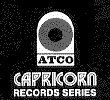
CAPRICORN PROD.
1969-1972 |
Editors Note: (a)
After Dick left Atlantic Records, their great promotion staff, that now included Phillip Rauls and Mario Medious had to work for a year to finally get "Layla" on major radio
programmers playlists. Per Atlantic's VP Dickey Kline, WIXY in Cleveland under Chuck
Dunaway was the first major station to play Layla. By the way, Layla was recently
voted the number one Rock song in music History! (b) Atlantic Album Discography
The Adventure: The hiatus...
a very long one
Two weeks after giving notice to his friends at Atlantic, Dick, his wife and young son
Christian left Atlanta and flew to Paris. They had no agenda, every day was unplanned,
travel was done on the spur of the moment, making this a once in a lifetime adventure...
The first day in Paris we regreted not reading the travel tips more carefully, we'd
planned for every contingency and had filled five huge bags that we now had to drag around
town and we were exhausted. That night we sorted through every item and anything that
didn't fit into two backpacks was tossed in a box and shipped back home. With that problem
solved, we were ready for anything.
We visited nearly every museum, took every walking tour, got stuffed to the max dining out
at every meal and so after a week in Paris we were ready for a change of scenery. Looking
over some brochures, we decided to take a train and go south through France, Spain and
head for sunny Portugal. We had to change trains in the middle of the night at the boarder
of Spain and Portugal then rode down the coast to Lisbon.
Lisbon is a beautiful old town and we took a trolley car tour around to the popular sights
for the rest of the day, then decided we wanted to find a quiet place to unwind. Back at
the Lisbon train station we climbed aboard a wooden streetcar that delivered us up the
coast to the seaside village of Estoril. Asking around in the market square for lodging,
we rented a rambling old ivy covered villa near the village that overlooked the market and
coast. The view was nice and the villa was staffed by a friendly Portuguese family that
prepared wonderful home cooked meals for us everyday and for the rest of the month we
relaxed and totally forgot about the world. For entertainment, we took long walks around
town, explored the nearby historic castles, but mostly we just enjoyed being around the
warm hospitality and friendly Portuguese people.
We loved Portugal, the people were great, the food was fantastic and we would have stayed
longer, but after some debate, we decided we'd like to visit Morocco. So, from Lisbon the
next morning we set off on a train to Algeciras Spain where we caught a ferry through the
Straits of Gibraltar and to our destination, the Spanish colony of Ceuta on the North
African coast.

The Seine, Paris |
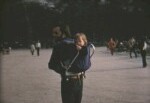
Dick & Christian, Paris |

View from Villa |

Villa in Estoril, Portugal |
Arriving in Ceuta in the midday
tropical heat, we were instantly surrounded by a mob of beggars and street vendors hawking
everything from hats to hashish. After stopping briefly to make a small purchase, we made
a dash to the town's central terminal building and arrived in time to see our fellow ferry
passengers leave the terminal aboard the last bus of the day. We were anxious to get
across the boarder before dark to give us time to find a comfortable hotel in Tetouan,
Morocco. A man standing nearby, overheard us complain, he'd obviously seen folks in our
situation before and offered to drive us to Tetouan in his Mercedes. With no other
alternative, we agreed on a price, got in the back seat and drove south to Morocco in a
big black Mercedes.
As we approached the boarder the driver slowed down, the bus we'd missed earlier was now
stopped in front of us. All the passenger were lined up in single file by the side of the
road, and armed guards were searching through their luggage. Another guard standing nearby
waved our limo forward and and as we passed he deftly plucked some cash from the
outstretched palm of our driver, the guard nodded and waived us through. Our limo driver
and new best friend, had just saved our asses. We began laughing and didn't stop laughing
all the way to Tetouan... the adventure was on.
Tetouan was an old crumbling adobe city who's main industry apparently was drug
trafficking, as everyone on the street wanted to sell us kef or hash. The town reminded me
of the "pirate city" on the planet Tatooine in the Star Wars bar scene, complete
with hooded figures darting in and out of dark alleys. Our limo driver and new friend,
found us a decent hotel for the night, we dropped off our backpacks and ventured out into
the streets to find something to eat. Later we saw some of the ferry passengers had made
it past the boarder and we swapped guard stories with them. We found a small restaurant,
but couldn't read the menu so we ordered something that sounded good and were served a
local dish of "couscous and pigeon".
Under the circumstances, the idea of going native seemed like the thing to do and acting
on a tip, we got up at daybreak to look for a green bus parked on a certain side street.
We found it, the creaky old bus had seen better days, it had a rope cargo net on top that
held luggage, live chickens and small farm animals firmly onto the bus's roof. We gave the
driver some cash and got onboard, after the driver was satisfied his bus was full, he
ground the gearshift forward and we lurched out of town in a cloud of diesel smoke.
We drove up a narrow gravel road that twisted and turned through steep mountain inclines
and past miles upon miles of hillside poppy farms. Occasionally we'd stop to pick up a
Gypsy families waiting along the road by a tent city or caravan and by late afternoon we'd
made it to the top of Morocco's rocky Atlas Mountains. After a day's travel up the jarring
white-knuckle mountain roads, we began a cautious decent down the mountain and into the
foothills as the smoke from overheating break pads wafted up through floorboards. Finally,
that evening we reached the desert flats below and entered the ancient walled city of Fez
through a Moorish arched gate.
Fez is a thousand year old city straddling the banks of the Fez river, it has been the
central market for silk, hand tooled leather, ivory and spice trading for centuries.
It is an isolated city and cut off from civilization by mountains on one side, desert on
the other... and here we stood, engulfed in the exotic smells and old world sights of this
ancient city, we truly were in a different world.
Adjusted quickly to our new surroundings, we toured the old city's Medina, helped along by
a child guide who spoke seven languages. He guided us through the narrow alleys and maze
of donkey filled streets to find out of the way traditionally hand-woven rugs merchants.
For days, we haggled for bargains, lingered at turn of the century French sidewalk cafe's
over the local mint tea and acted like we'd lived there forever. At the end of the
day we'd relax over an exotic meal, puff smoke from a hookah and watch the desert sunset
from our hotel balcony.
Almost every morning the Royal Calvary woke us when they passed by on the street below,
they sat atop beautiful black mules and rode in formation down the avenue. They flew the
King's colors and were the escorts for the Moroccan royal family on state occasions and
during festival parades.
After two wonderful, fantastic weeks in Fez we had to leave. We were running low on
necessary supplies for our son Christian and were anxious to get back to western
civilization and drug stores. We rented a small French car and drove through the desert
over a narrow strip of asphalt road to Rabat, we spent the night at an ocean front hotel,
then drove up the coast to Tangier where we booked passage back to the continent.
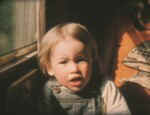
Christian on the Train
(Note the ABB Tee Shirt) |

The Medina in Fez
(True, Donkeys have the right of way in the
Medina) |

Innsbruck, Austria
(Great food, great beer and great skiing) |
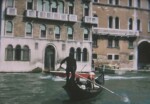
Gondola ride, Venice
(So many things to do here |
We took a ferry from Tangier
Morocco to Tarifa Spain, then traveled by train to Rome, then up to Florence and
Venice for an extend layover and where we did what all tourists do, rode in a gondola and
bought Murano glass. We took the overnight train up to Innsbruck Austria where we bought
ski equipment and taught ourselves how how to ski down the most spectacular mountains in
Europe. In the evenings, back at a family owned chalet where we stayed, we'd have a
steaming hot bath in a tub the size of a small car, then walk down the hill to an
Innsbruck beer hall, sit by a fire and have the best beer and schnitzel in the world.
After a couple of weeks skiing in the Tyrolian Alps, we got restless and hopped on an
overnight train through the Swiss Alps and into Zurich Switzerland. Zurich is a bleak city
and everything cost twice as much as it did anywhere else, so after one nights stay we
returned to the train station the next morning, got on the bullet-train and went north at
150 mph. At that speed the landscape was a blur of colors as we sped past windmills and
multi colored tulip farms over the flat landscape of the Netherlands. Soon, we'd arrived
at the train station in Amsterdam and instantly fell in love with the beautiful city, the
canals, the history, the architecture, the fine museums and the gracious lifestyle that
evolved from centuries of free thinking, open minded people.
We felt bad leaving Amsterdam after only two short weeks, but we wanted to see the King
Tut exhibition at the British Museum in London. We caught the ferry across the English
channel and took a five day layover in London. After our full museum and crown jewel tours
we left London and went south by train to the seaside resort of Brighton. We lodged at a B
& B for a few days, then rented a camper van and began a leisurely drive through the
lush green countryside of Western England.
After getting used to driving on the wrong side of the road, we drove into Wales and
toured the old graystone B & B's and pubs in every hamlet, some that had been serving
the public for hundreds of years. We'd stop in at a smoky pubs for beer and pub-grub and
listen to the locals converse in their native Welsh language. Although half of my family
was of Welsh origin, I didn't understand a word of the language, I was just thankful the
road signs were printed in both Welsh and English.
Finally, as the time for our departure approached, we backtracking over the channel,
passed through Belgium's odorous industrial grime and arrived safely in the micro-country
of Luxembourg, with a day to spare before our return flight to America.
"After months of being submerged in other cultures, outside your comfort zone, your
mind opens up to new possibilities and endless potential. This experience is available to
anyone willing to take a chance. For me, it was a once in a lifetime experience when I
didn't think about the music business, or getting records on the charts. I only thought
about the people I loved, my family and friends"
The many months of travel seemed to go by in an instant, before we knew it we were back
inside a plane headed to Atlanta. After an uneventful flight across the Atlantic, we
picked up our backpacks from the baggage carousel, hailed a cab and told the driver to go
to the nearest Krystal where we ate about a dozen hamburgers, the first "real"
hamburgers we'd seen for many months.
Life was good and it was good to be home.
Back
to Top
Capricorn Records:
The start-up
After months of traveling, Dick realized the hiatus could
not have been better timed, because back in the USA the tide had turned in Rock radio. The
new independent FM stations were playing progressive rock full time and driving the once
too-big-to-fail AM stations out of the market. Hooray... finally bubblegum music was out,
and progressive music was in. Dick reflected, "For me, it was a great time to get
away, but leaving Atlantic Records had been like leaving my family".
Back home in Atlanta, Dick was full of ideas and ready for a challenge when Frank Fenter
called and things went into high gear. Frank invited Dick to a meeting in Macon Georgia
with he and his partner, artist manager Phil Walden.
Dick knew Frank well from Atlantic Records, they shared information when Frank ran
Atlantic's European operation from the London office. Frank was a rising star at Atlantic
and was a highly respected record man who had surprised everyone in 1969 by moving from
London England to Macon Georgia to partner with Otis Redding's manager Phil Walden in a
production venture.
Frank was the man behind the scene who'd put the deal together for the new production
company, it was financed and distributed by Atlantic's Atco label. Jerry Wexler, the
partners mentor at Atlantic helped Phil and Frank after the initial funding by giving them
a Top10 Hit Single "Sunshine" by "Jonathan Edwards."
It had been three years since then, and Dick was anxious to hear what the guys had in mind
as he flew south to Macon for their meeting. Having a meeting over lunch with Phil and
Frank was a real eye-opener, lunch consisted of "Hoppin' John" (black-eyed peas,
rice and fried fatback) along with three or four double Vodka Martinis in iced tea
glasses. Dick said, "I wasn't much of a drinker and even if I was there was no way
could I keep pace with those two guys." As one martini led to another the two
partners tag-teamed me offering up one idea after another and my head began to swim with
possibilities.
I tried to nurse my drink for as long as I could to keep my mind clear as they sold me
their plan on joining them in Macon to help launch a full record company from their
"yet to be profitable" production company". I tried to leave the meeting on
a positive note as the three hour lunch wound down, but I was by no means convinced it was
in my best interest to help promote a start-up label in Macon Georgia, and at half the
money I made at Atlantic Records.
Back in Atlanta, Dick's friends were advising him not to move to Macon, mainly because
he'd be gambling a hard earned music business reputation on an unknown start-up label.
Also, the industry wags said, the Allman Brothers Band could never recover from the death
of their charismatic leader Duane Allman. But the real obstacle to overcome was the Allman
Brothers were nearly unknown outside the South, they'd not sold any singles in what was
still a singles-oriented business and they'd only sold about thirty thousand albums, that
was the reality.
Phil's publicity proclaimed that the band had sold ninety thousand albums, but Phil had a
quirky formula of three's he always used, if a number helped it was multiplied by three
and if it didn't it was divided by three. Dick knew the real sales numbers because he
promoted the Atco albums, but also he reasoned the lack of sales for the ABB was because
major radio at the time would not play progressive or regional artists.
Dick had to make a life changing, irreversible decision whether or not to sell his
stylish home in the upscale Morningside neighborhood, in the progressive city of Atlanta
and move to a small town known as "the redneck capitol" of Georgia. There just
was no other way to say it, Macon was a southern backwater that had changed little since
the civil war and was led by a two-term white supremacists mayor known as "Machine
Gun" Ronnie Thompson. Thompson got attention in the national media for his
disgraceful leadership during Macon's predominately black sanitation workers strike.
Thompson stood atop a National Guard armored tank in a school playground waving a
submachine gun and giving Macon Police officers orders to shoot to kill disorderly black
citizens.
Thompson was a reflection of the electorate, the same type knuckle dragging rednecks
that'd hassled Dick in years past when he promoted Atlantic R&B records at black owned
southern radio stations and associated with black artists and DJ's. To say the least, the
Capricorn job was handicapped by the reality of having to move to Macon.
In addition, Dick had reservations about Phil's well known erratic temperament, but he
rationalized that thought after remembering the good times together at Atlantic shows when
Phil and his brother Alan Walden had co-managed Otis Redding. And even
bad times, like in December of 1967 when Phil and
Dick were in Atlantic's suite at the Rivera hotel in Las Vegas attending a
Billboard convention when a telephone call came with
the tragic news of Otis Redding's plane crash.
Dick knew Frank and Phil's offer probably wouldn't last long because they were pressing
him hard for an answer, they admittedly were not record promoters and they knew Dick could
get them the airplay they needed. The deal
closer came when Johnny
Sandlin played Dick raw tracks from the
yet to be released Allman Brothers "Eat A Peach" album and Dick was blown away.
Soon after that, there was a meeting of the minds between Dick, Phil and Frank they began
to discuss and clairify the areas of responsibilities that each would have under the new
Warner Brothers distribution venture. Frank naturally would continue to manage the
company's production, Phil of course would continue to manage the artists, leaving Dick to
get airplay and records on the charts.
The timing was dicey, Frank Fenter had just finalized the deal that separated Capricorn
productions from their long-time mentors at Atlantic Records and was jumping into an
untested distribution pact with Warner Brothers. Phil and Frank wanted their own lable
something they said Atlantic had resisted until 1971, then only released their product on
a pink label. Warner Brothers had encouraged Phil and Frank to use the Capricorn Records
name and promised to increase the label's profile, by doing this Mo Ostin and Joe Smith
kept the label within the newly formed WEA distribution family.
However, the record business buzz on the street was, "If Capricorn left soulful
Atlantic Records for Warner Brothers, who's biggest artist was still Frank Sinatra, it
would be the kiss of death". Dick heard all the gossip, but said "It didn't
bother me, when you're an underdog, you put on blinders and go forward. I'd competed in
tournament karate, winning a few, but my ass was kicked a few times too and I knew for
certain that promoting a new record label could never be more painful or humbling than
that... so bring it on."
A few weeks later, Dick had his family settled into a comfortable old 1890's home on tree
lined Orange Street near downtown Macon. The label's Cotton Avenue office was only a few
blocks away, Dick, Frank and Phil shared what had been the office of the late Otis
Redding. It was two small rooms with thread bare carpets, a small reception area with dark
red curtains hanging from every wall, located directly across the street from the Macon
Police Station and the Mayor of Macon's office "Machine Gun" Ronnie Thompson.
Dick recalled, "we were squeezed in together, but it didn't matter, we were hard core
professionals with a goal. Frank and Dick had their education at Atlantic Records and knew
how to keep Capricorn's new releases from getting lost in the shuffle of releases sent out
by Warner Brothers each month and they knew how to get the new label national
attention. We also knew we'd have to work 24/7 to do it and make Capricorn a success,
but we were committed to do whatever it took, we were on a mission."
It was not going to be easy getting a breakout hit for the new label as Dick discovered
early on after a few days of unproductive phone calls to radio stations around the
country. When calling these stations soliciting airplay for the ABB album, receptionists
and music director would ask "Capri' -what? Allman -who? Macon
-where?" Dick decided quickly that instead of calling stations he didn't know,
he'd target old friends at the new FM stations, plus the few remaining at AM radio and
badger these old pals into playing his new "Eat A Peach" album.
At that time, the raw fluid sounds of Southern Jam Rock was not the type of music these
radio stations were accustomed to playing, but several of Dick's pals in Atlanta, Boston
and Los Angeles radio soon were onboard and after only a few days airplay were shocked by
the positive listeners response on what was becoming known as "Southern
Rock"... and so the ride began.
After the "Eat A Peach" album started moving up friendly radio station charts,
Dick went to work on the harder to move conservative middle America radio stations. Each
time a new station was added shouts of victory rang through the small office, and
gradually the ABB album began showing up on more and more radio playlists around the
country until a critical mass had been reached when the album posted in the lower regions
of the national charts.
This small success was enough incentive for the powerful Warner Brothers team to push the
marketing button on the "Eat A Peach" albun and it was soon on it's way up the
national charts to become the Allman Brothers Band's first Gold and a few years later
became their first Multi-Platinum album.
Near the end of
summer in 1972, Dick and his friend Bill Sherard who programmed Atlanta's top radio
station WQXI were talking about what to program on the upcoming 1973 New Years. The ABB
and Wet Willie were playing a venue called the Warehouse in New Orleans and Dick mentioned
that the local station had asked to air the New Years show live. Immediately Bill said if
they did, he wanted to air the show in Atlanta and they began to plan a New Year's
simulcast linked from New Orleans to Atlanta.
After finding out from the telephone-company the only cost to simulcast the show from New
Orleans to Atlanta was a long distance line charge. Dick decided to take the idea a bit
further and invite other stations in the region to plug into the live feed. Dick rented
the AT&T long-distance lines for the night and began signing up other southern AM and
FM radio stations, he cobbled them together and with a little promotional hype called
it a "radio network".
It would only cost $700 to connect
the two anchor stations so Dick gave the show free to the "network" stations
provided they played the ABB and Wet Willie albums in heavy rotation in the run-up to the
broadcast and give Capricorn some commercial spots. It was an unproven idea for rock radio
at the time, but only because no one had done it... yet.
The New
Year's broadcast, "Live from New Orleans" with the Allman Brothers Band and
Wet Willie originated from the cavernous "sold out" Warehouse and was a great
success. Dick's broadcast had only reached thirty stations in eight southeast states but
it received national trade attention. The show was a success for the radio stations, the
promoters and especially Capricorn Records. Johnny Sandlin recorded several great tracks
to use in future ABB projects and he also recorded the classic live album "Drippin
Wet" with Wet Willie.
The success of the regional New Years show proved to Dick that without spending a lot of
money that at the time Capricorn didn't have, or endlessly calling radio stations, there
was a better way to expose his new artists and it was by broadcasting free live concerts.
This was the artist launching idea Dick had been hoping for, "assemble an event,
simulcast over multiple radio stations and syndicate the show." That year, Dick
broadcast several more live concerts to test the new system, they all proved
successful and he knew this new promotion vehicle could be big-time.
In reality, it already was big-time for Dick because as the only full-time record promoter
for Capricorn, he had to call on programmers one-at-a-time trying to convince them to give
his new releases airplay. This was a time consuming and arduous before the New Year Show,
but after the broadcast's success, programmers began calling him from around the country
asking for exclusive market rights on his next show. Using the New Years show as leverage,
Dick was in the proverbial "Catbird Seat" for promoting his developing bands...
Eureka!
At the time Capricorn was not flush with money, and Phil decided to sell three management
company artists to Polydor Records. The Marshall Tucker Band was to be one of the three,
but at the last moment Dick and Frank Fenter decided to liberate their tape from Phil's
briefcase and flew it to LA for a scheduled A & R meeting with the Warner Brothers
executives. They played "Can't You See" for the WB staff and a date was set for
the MTB album to be released on Capricorn. In New York however, Phil was caught off guard
when he got to his meeting only to discover there were just two tapes in his briefcase,
but as testament to his dynamic salesmanship Phil closed the Polydor deal despite having
only two bands.
Upon everyone's return to Macon there was a heated discussion between the three Capricorn
executives regarding the objectives of Phil's management company, versus objectives of
Capricorn Records. The issue was soon resolved as the both deals were fait accompli and as
Frank Fenter eloquently reflected later "sometimes it's easier to get forgiven than
to get permission".
With national airplay momentum building in 1973, Dick began to set up the next New Years
broadcast featuring the Allman Brothers and opening the show with the Marshall Tucker Band
and Charlie Daniels. Dick added (150) new stations to the Network he now called CapCom, two national
sponsors were added at 50k each (Landlubber and Pioneer) and viola... the music industry's
first vertically integrated Rock & Roll promotion was created.
The 1974 show would be broadcast from San Francisco's (15,000) seat "Cow Palace"
and Bill Graham
the legendary owner of Fillmore East & West was the promoter. Bill invited San
Francisco's FM radio pioneer Tom Donahue to be the show's MC, and Tom in turn recruited
several of his San Francisco friends, members of the Grateful Dead, Boz Scaggs and other
great San Francisco artists to play and do interviews during the show to add color and a
few surprises.
Dick didn't know Bill well, they'd only met at shows, but Dick knew Bill Graham was the
ultimate showman and Bill proved that to be true when at midnight during the sold-out New
Year's show, Bill descended from the highest balcony of the giant hall inside a huge
wicker basket onto the stage dressed as "Old Father Time" sporting a long
flowing white beard. The Allman Brothers stopped briefly to hail the new year and picked
up on the jam where they'd left off... it was a magic New Year Eve show.
The "first of a kind" national radio broadcast was a brilliant success,
especially after Armed Forces Radio called to ask permission to air the show on their
global network, the answer of course was yes! Armed Forces Radio plugged into the live
feed and broadcast the show all over the world to an estimated (40) million listeners (as
far as its known, still the largest radio audience for a live Rock & Roll event).
Foreign and domestic album sales sky-rocketed after the show, the ABB's new Warner
Brothers album and the Atlantic Records past catalog albums began selling through the
roof. The show launched the career of "The Marshall Tucker Band" and a couple of
months after the show their debut album had sold (250) thousand copies and soon becoming
their first gold, and later became a multi-platinum album.
The New Year's broadcast was a music industry landmark, the week after the show its story
was splashed across the front page in every trade paper in the country, banner headlines
in Billboard,
Radio & Records, Cashbox. In July of 1975 even the prestigious business magazine Fortune did a major spread about the meteoric rise of Capricorn
Records, highlighting business stories and the personalities of Phil, Frank and Dick.

Dick Wooley in
Fortune Magazine
July 1975 |
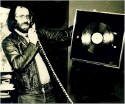
Dick Wooley & ABB's
First Gold Album
"Eat A Peach" |

Dick Wooley in R & R
Headline Jan, 1974
40 Mil. Listeners |

Dicky Betts,
Dick Wooley
& Frank Fenter |
Check out some great photos of the Historic 70's Atlanta-Macon music scene
by; Carter
Tomassi click here - Phillip Rauls
click here |
By 1976 the hard earned success of
Capricorn Records was overwhelming the small company, the new venture had paid off big
time, the artists were headliners and Southern Rock was ubiquitous on world radio
stations.
Later that year, Elvin Bishop signed a production deal with Capricorn and one day Frank
Fenter began playing a new track from Elvin's session over and over in his office, knowing
well that Dick would hear it in his office next door. This was Frank's usual "not so
subtle" way of letting Dick know what songs he thought should be promoted. After a
full day of Frank's good natured brainwashing, Dick got the message and admitted he liked
the song too, but told Frank the album track needed rearranging because it wasn't
structured right as a single for radio airplay.
Dick took Frank's cassette and played around with the arrangement for a couple of days,
arranging and rearranging, trying to find the sweet spot that would best fit radio formats
of the day. Satisfied with a final arrangement, Dick and Frank flew to LA as they'd
successfully done before when they played a raw cassette tape of the Marshall Tucker Band
to the Burbank brass. The Elvin Bishop track was played for WB President Mo Ostin, VP Ed
Rosenblatt, head of Promotion Russ Thyrett... they loved it. Once Warner Brothers' great
staff got behind it "Fooled around and fell in love" quickly became the number
one single on all trade publication's Top 100 singles charts.
Everything Capricorn was being celebrated, the little Macon Georgia record company that
showed everyone you didn't have to be in New York or Los Angeles to make it big in the
music business. Reporters from Rolling Stone, Newsweek and Fortune were constantly on the
phone or in the office. Our artists were in demand and other top artists wanted them to
play on their projects. Our annual company picnic, that only a couple of years before was
as a simple barbeque office party for employees at the lake, was now being attended by the
major music executives of the day and iconic celebrates like; Cher, boxing promoter Don
King, comedian Richard Prior, artist Andy Worhol, singer Bette Middler, 60 Minutes' Ed
Bradley and future president Jimmy Carter. Macon's airport was crowded with their private
jets and reporters hung on every word, but the pressure cooker atmosphere was building and
would soon be resolved in a way no one could have imagined.
Drugs were an important part of the 70's music culture, in the recording studio, in the
office and in our social life, it was as essential as gin to a martini. Everyone did
drugs, some to keep pace, some to escape the pace and some to keep their demons at bay.
The ever-increasing demand for Capricorn to be bigger, better, faster took a toll on
everybody.
The price of our success took an especially heavy toll on Phil Walden, his demon was
cocaine addiction and with the celebrity of Capricorn it began ragging out of control,
manifested by embarrassing public tantrums that kept our lawyers busy and everyone else on
edge. Phil's infamous outbursts were becoming more frequent and explosive, it was
impossible to tell when the next one might happen, when it did, friends and family alike
made themselves scarce and the company employees ran for cover in their offices.
Frank Fenter and Dick found themselves in a no-win situation, at the end of a hard days
work their duty to Capricorn now included saving face for the company by smoothing over
hurt feelings, fixing injured relationships and covering up Phil's drug-fueled tirades.
After one particular ugly felony assault charge was filed against Phil by a well-known
Macon businessman, the Macon newspaper had a field day. Phil had become an object
of derision locally and only the quick intervention of expensive lawyers and a large
cash settlement to the businessman kept it out of court. Phil was undaunted by the
escalating consequences of his actions and as he fed his addiction his erratic behavior
continued to embarrass.
Dick opined, "when drugs take over someone's life, they go into a state of denial and
there's not a damn thing you can do, especially when they're convinced they're on top of
the world". "I'd seen friends succumb to heavy drug use before, some lived and
some didn't. I discussed my concerns about Capricorn's future with my family and told them
to be prepared for a change. In spite of Capricorn being on top of the charts then, the
office atmosphere was becoming more unbearable and unbusinesslike by the day, I saw the
handwriting on the wall and knew the ride would soon be over."
Success is fun, but it's not satisfying and it was boring grinding out one promotion after
another. Especially since Elvin Bishop had a number one hit single, two Allman Brothers
albums were near the top of the charts and two Marshall Tucker albums were climbing the
charts right behind. After long days of promoting radio and endless nights
hanging out in the studio or clubs with bands, Dick was ready for a break.
Dick took a chance that a silver lining would be available to him after guiding three
Capricorn artists to the top of the charts that year. Also, he knew there would never be a
better time to start a new venture. In 1976 Dick resigned as Vice President of Capricorn
Records. Professional courtesy dictated that Dick stay on for a few weeks after the
announcement to assure a seamless transition for his successor and professional courtesy
also dictated that he never let on that the Capricorn party was ending.
Reflecting back on the four years since moving to Macon to help build Capricorn Records,
its growth had been unimaginable. Capricorn had sky-rocketed from three guys in a two-room
office, to a Southern Rock Empire with sixty employees and a roster of great artists that
sold records worldwide and earned annual sales of $30 million. "It had been a sweet
ride" Dick recalls.
In summary: As Vice President of Promotions at Capricorn Dick helped launch several
million-selling artists including: The Allman Brothers Band,
Marshall Tucker Band and Elvin Bishop. Other artists launched into the national spotlight
included; the great Southern Blues band: Wet Willie,
comic-singer-actor Martin Mull, venerable singer-songwriters and "Eric Clapton's
favorite band" Cowboy, the
legendary Southern Rock band Grinderswitch, young Bluesman John Hammond, Jr. and rising Country Music Star Hank Williams, Jr.
Editor's Note: (a) After Dick left Capricorn, the company was
never able to launch another major artist and began it's decline into bankruptcy. Shortly
after Capricorn's bankruptcy, the meteoric life of a great record man Frank Fenter ended
long before his time at the age 47. Phil Walden eventually gained control over his alcohol
and cocaine addiction and in 1990 started a new Capricorn label. (b) Capricorn Album
Diskography.
Back
to Top
Rabbit Records
& DWA: The start-up
1976 was a wild and crazy year, Dick left Capricorn Records at the top of
the charts and helped the Jimmy Carter presidential campaign with free promotions and
advertising. His old friends at Atlantic Records called and wanted him back with the
Atlantic family and promised to finance Dick's idea for a new company.

Dick in Macon |

Christian on the Bentley
|
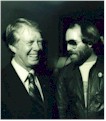
Jimmy Carter and Dick
|
In short order,
Dick's music attorney Eric Kronfeld struck a deal with Atlantic and the doors opened at
Dick Wooley Associates and a new label called Rabbit Records.
Flush with funding Dick recruited top Warner Brothers promotion man Al Moss to the new company and
asked two great bands to sign on. Dru Lombar's Grinderswitch, managed by Alex Hodges, who
today heads-up "Neiderlander Entertainment" and the Winters
Brothers Band, managed by Charlie Daniels' then manager Joe
Sullivan, who today is a key player in Branson Missouri's mega entertainment
complex.
After releasing the two band's albums, Rabbit Records mid-charted both the Grinderswitch
and Winters Brothers albums that year and built their career by keeping the bands steadily
on tour opening for the Charlie Daniels Band, The Allman Brothers Band, Marshall Tucker
Band and Lynyrd Skynyrd.
Dick's neighbor on Walnut Street in Macon was young attorney-band manager Pat Armstrong.
Pat came by the office one day in 1977 to ask Dick if he would help him launch a new band
he'd managed and said they were being looked at by a major producer. Pat Armstrong had
been Lynyrd Skynyrd's first manager, before Alan Walden and now Pat had a huge roster of
college circuit bands, but felt somewhat left out because despite having been an early
player in the explosion of Southern Rock, Pat hadn't participated in it's success.
Dick went to see Pat's new band in the basement club of a seedy downtown Macon
flop-house called the Dempsy Hotel. It was the venue from Hell, with water standing an
inch deep on the dance floor, Dick said, "it was a miracle nobody was
electrocuted." But, as bad the surroundings were, Dick saw the band's potential and
said he'd work their album when it was released.
Dick got Pat's heads-up a month before Molly Hatchet's album released and he went to work
promoting it to radio stations. Dick added so many stations the first week Epic Record's
responded by throwing a pile of development cash at Pat to start the band on tour. Soon
the whole country knew about Molly Hatchet, the self
proclaimed "Bad Boys" of Southern Rock.
Molly
Hatchet's debut album and tour was a huge
success, the album was going gold, then later went multi-platinum. There were two big
smiles on Walnut Street, Pat Armstrong was smiling because his future suddenly looked
bright with a new hit album and his band on a coast-to-coast tour of the country.
Once again Dick proved his ability to take an unknown band and promote it into a
million-selling album. Dick against all odds had delivered his first major breakout artist
with Molly Hatchet since he'd left Capricorn the year before... and it felt great!
In 1981 a devastating tsunami
called "Disco" swept over the music business sinking airplay for all other
types of music, including Southern Rock, Progressive and Blues Rock. Dick's marriage also
hit the rocks that same year and he decided to take time off from the music business, move
to the beach and live a quiet life.
Dick moved to Tybee Island, a small island off the coast
of Savannah Georgia connected to the mainland by twenty miles of causeway and at the end
of Highway 80. Tybee was a quiet fishing village of 1500 people at the time and was the
perfect place to chill out, write songs, buy a Hobie Cat, learn to sail, build a beach
house and look at the record business in the rear-view mirror.
Back
to Top
2004 King
Mojo Records: The start-up
Fast-forward to 2002... Dick, still enjoying life in the
slow lane on Tybee Island, writing songs for Cotton States Music Publishing and in a
partnership with Arthur Schultz, President of Benchmark/Atlantic Property Development
company. Dick and Arthur became partners to develop an original college community concept
they designed and opened sales offices in five university towns in the Southeast and
Midwest.
Art and Dick, with a sales staff of thirty people sold their seven college condo
communities, producing sixty-five million dollars in sales from 500 student
condominiums. On a personal note, the success of Benchmark/Atlantic proved to Dick
that his sales skills and promotional abilities applied to other businesses equally well
and was happy to discover that he wasn't just a one-trick-pony... The process of planning,
sales and development had taken over two years, it was exhilarating and exhausting, so
ready for a rest Dick tried his hand at retirement again.
Family interests brought Dick back to his home town of Atlanta in 2004, and after settling
for a few months found not having a project in the works was kind of boring. Dick had
always been hooked on the process of developing and promoting new music, ideas or
whatever, "it's what gets me out of bed in the mornings" ... so his search for a
new project began in ernest.
Always with an interested in music Dick saw an opportunity. After watching a new
generation of young fans sell out summer fusion-blues festivals an idea formed about how
to serve the market and this under-served music niche. Strangely, the music that was
attracting thousands of young fans to these sold out festivals was not being played
on radio!
This failure of today's radio stations to address this niche market was just a reminder of
the FM-AM takeover situation in years past, a lesson that was not lost on Dick. Experience
is knowing when to look beyond what is the flavor of the moment and start something new.
That time is usually when the well financed corporate interests chase the easy dollar and
take their eyes off the ball.
Dick was well aware of another music business failure in the 1990's when the major
record companies had a golden opportunity to incorporate new Internet technology into
their business model... if they'd incorporated that technology they would have kept their
dominance in the music world.
But at the crossroads of music and technology in the 90's the music business
powers-that-be were closed minded. They thought it was a preposterous idea that someone
working out of their garage or dorm room could possibly challenge corporate music business
dominance... Napster proved them oh so wrong!
Today the multi-national corporate record companies and land based radio stations are
slipping into irrelevance, as more and more Internet applications dismantle their business
model piece by piece. Major record companies are only a faint echo of their once dominate
presence. If you need more evidence, listen to the meaningless releases they bombard us
with today.
The corporate music business grows more irrelevant each day and is now in a total
financial free-fall... passed up by an online world of music, much like cars overtook the
horse drawn carriage. This fact presented a new challenge, how to bring the best original
talents and other interested parties together to create something that benefits people
that love real music, music that is being ignored by corporate radio, music that has its
roots in the blues.
After talking it over with several musician friends, the idea of opening a small Internet
based Indy record label began to form and King Mojo Records was announced. Dick knew to be
a successful provider of blues rock the label would have to be driven by its
artists. On the short list of original blues rock artists was his friend of thirty-years,
guitar gunslinger and blues rock legend Dru Lombar. Dru was the founder and leader
of the great Southern Rock band "Grinderswitch", Dick had worked with them
at Capricorn and Rabbit. Dru and Dick got together in Atlanta the next week, Dru
signed on with the new label and the King Mojo Record company start-up was official.
Several emerging blues-rock artists were identified after a few months search and were
asked if they were ready for a new career challenge and after agreements were made these
artists were showcased in 2004 on the first virtual King Mojo compilation album.
The new idea immediately gained traction on the Internet with the first virtual
compilation album of free downloads or hard copies upon request. Getting over 100,000 hits
the first month with nearly 60,000 fan downloads. The idea proved simple and
straightforward... offer great original blues and rock music by great emerging artists
using a central assembly location on the Internet.
The goal was clear, "Find the best emerging artists in
contemporary blues, roots rock or fusion and showcase them on
virtual compilation releases via the world wide web and their career growth will go
viral." We began promoting these artists with this first King Mojo
compilation....
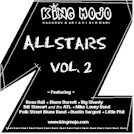 |
King Mojo Allstars, Vol. 2
in addition to the artists featured on Vol. 1, Diane Durrett, Mike Lowry and The
Polk Street Blues Band the second release in 2005 added Big Shanty, a Bluesmans tales of hard luck, hard times and
hard women. ~ Beau Hall,
unstoppable kinetic energy. ~ Bill Stewart and the ATL, original jazz cooked up by the
very best Atlanta studio musicians. ~ Little
Phil, a great Southern Soul singer, who's always entertaining. ~ Dustin Sargent, a powerful Jazz
statement from a seasoned young group. |

Beau Hall
|

Mike Lowry |

Polk Street Blues Band |

Big Shanty |

Diane Durett |

Bill Stewart & ATL |

Little Phil |

Dustin Sargent |
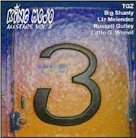 |
King Mojo Allstars, Vol. 3: "Some of the very best original
artists playing today are on Vol. 3. Featuring: TGZ Dan Toler the legendary
guitar player formerly of the Allman Brothers Band ~ Big Shanty debuts two new tracks on "Allstars, Vol. 3" from his
next album ~ Liz Melendez guitar prowess alone puts her above her contemporaries ~ Russell Gulley the fervor of gospel music that provided the fire of early secular
music ~ Little G.
Weevil it was like my grandfather telling his tales. Their performances light up the
field in contemporary blues, roots, jazz and fusion music". Read More... |
 |
TGZ
is Dan Toler the legendary guitar player formerly of the Allman Brothers Band and Dickey
Betts & Great Southern, Ed Zinner the guitar power of Southern Legend and Jazz pianist
Ron Gary. Three founding members come together to create an unrivaled combination of
talent, passion and imagination. But, it doesn't stop there, other great musicians adding
their flavors to the mix include; John Townsend, Tony Green, John McKnight, Avon Lucas,
Matt Zeiner with special guests Viktor Krauss and Floyd Miles. Toler’s southern
blues, Zinner’s rock and Gary’s jazz culminate into something magic that's best
described as BLUSION! ~~~~ |
 |
Big
Shanty's 2006 album stayed at the top of online radio charts worldwide for
many months with fresh "Fusion/Blues". Shanty twists Club Beats, Alternative,
Funk and Delta Blues into hypnotic dada rhythms that keep the dance floor shaking while he
spins tales of cruising down back roads, lost love, good girls gone bad and living large. Shanty isn't afraid to funk-up
traditional blues, or have contempt for war-mongering politicians [video].
Big Shanty sings without trepidation, his voice is as hard driven and purposeful as the
heavy punch delivered by drummer Scott Robertson. Shanty debuts two new tracks on
"Allstars, Vol. 3" from his next album. ~~~ |
 |
Liz
Melemdez's guitar playing has been
compared to everyone from Carlos Santana to Stevie Ray Vaughan and her voice is compared
from Bonnie Raitt to Janis Joplin. She's considered by many to be one of the top-ten lead
guitarists in the country, her live performances demonstrate her versatility, often paying
homage to her influences as a highlight to her own clearly defined lead guitar and vocal
style. Many believe Liz's guitar prowess alone puts her above her contemporaries, but when
combined with the strength of her vocal ability and her skills as a songwriter she is a
genuinely unique and powerful artist. ~~~ |
 |
Russell Gulley
was born in Rome, GA into a blue-collar family, dad in the forestry service and a mother
in the cotton mills. Late at night he'd listen to far-away blues radio, and those blues
stations became his music instructor along with the Pentecostal Church choir. It was the
fervor of gospel music that provided the fire of early secular music, and it was in the
church that Russell realized he had something in common with those early rock and rollers.
Today, Russell has come into his own, his original songs and style speak to an era of
"times gone by" and all it takes for you to be right there with him is just one
listen. ~~~ |
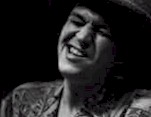 |
Little G.
Weevil is a remarkable young guitarist, singer and songwriter from London,
England who really captures the essence of Memphis Blues. He was introduced to the blues
of John Lee Hooker at age 17 and it ignited his music career, "it was like my
grandfather telling his tales, and I thought... I am part of this, I feel it, I belong to
this". Little G. has performed throughout the South, in famous Beale Street blues
clubs in Memphis and shared the stage with many blues legends like Big Jack Johnson, The
Neville Brothers, Pinetop Perkins, Hubert Sumlin, David "Honeyboy" Edwards, John
Hammond, Clarence "Gatemouth" Brown and Bobby Rush. |
Stay
tuned...we'll keep you posted on progress with our monthly newsletters.
Back
to Top
|